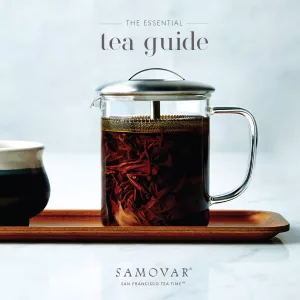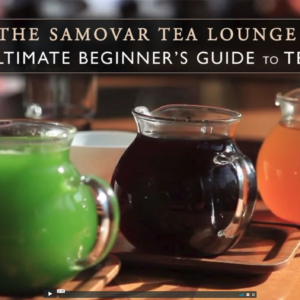Agrarian society fed the Industrial Revolution. The Industrial Revolution created the tools and workforce for the Information Age. But what comes next? The pattern of change in human development is as predictable as it is disruptive. The one constant in this world is that nothing lasts forever.
So where are we headed now?
Joshua Jacobs, who works on Special Ops for us at Samovar Tea Lounge, has been a key collaborator for the last 12 months, and he has some interesting ideas on this subject. Rather than speak for him, I invited him to write a guest post here and share his perspective.
Recognize the last name? Yup, he’s my brother. But don’t think that means I’ve been easy on him—I’ve already fired him three times…
Best Practice #1: Never Trust A Best Practice
Best practices only make sense within a particular context. Applied in the wrong context, they’ll produce horrid results. The best practices at Google bear almost no resemblance to the best practices at a 3-person app development shop. Change the context and the governing rules also change, making all “best practices” worthless unless they are tailored to the situation.
And the consequences are huge. It’s why the Luddites could not stop the industrialization of their craft. It’s why telephone operators were replaced by Cisco routers. It’s why Borders and Blockbuster went bankrupt.
The Ages of our civilization don’t end; they evolve. First slowly and with incredible resistance, and then faster and faster until the cycle is complete.
The fact is, the Information Age has already evolved into a new era. How do I know? By looking at the results.
Think about our current economy. When the government is in debt, the conventional wisdom is that there has been fiscal irresponsibility. But when we as individuals spend more and take on debt, that’s supposed to be a good economic indicator. Can someone explain how this makes sense? By what rationale does it makes sense to measure the health of our economy by how much we spend?
The best practices that we’ve grown so attached to have been producing dismal results. And that will continue until we realize the context has changed.
So what is the context? I call it The Age of Empowerment.
The scarce resources that enabled top-down, pyramid-shaped corporate structures have dissolved with only a shimmering illusion in their place. In The Age of Empowerment, abundance is the rule in (at least) three critical areas:
- abundant access to markets.
- abundant access to information.
- abundant access to people.
Before, when you had a great idea, you’d need someone in authority to validate your credentials. Who else is investing? Who else published/produced your work? What Ivy League did you attend? Now, however, it costs nothing to put up a web page or blog to share your art, find artists, sell products. There’s even a market for vegan taxidermy!
Before, when you needed information or know-how, you’d to go to the library, get an MBA or MFA, etc. But when’s the last time you went to the library to research something? Combine the open courseware movement with the flood of tutorials and wikis, and now the question is “What can you NOT learn online?” Ignorance is a choice.
Before, making contact with people you didn’t know was incredibly difficult. Harder as the people became more famous. But now, is it hard to contact anyone?
Best Practice #2: Don’t Believe Anything Anyone Says
Please, don’t take my word for it. In fact, don’t believe anything anyone tells you. The evidence is just a search/click/tap away. Find a reliable source; make your own call. The truth is out there.
Here are some sources that I draw daily inspiration from:
Seth Godin has developed a massive following by challenging the status quo and has built a reputation by doing something most authors consider “dangerous”: giving huge amounts of his work away for free.
Tim Ferriss has published three bestselling books, including one book that wasn’t even carried in brick-and-mortar bookstores for months. But he didn’t learn to write in school! He learned to write by writing, blogging, reading, and connecting with people.
Jonathan Fields decided to quit law and chose a new path. Now he’s producing videos (The Good Life Project) of truly inspiring people who refused to follow the “rules” and instead “picked themselves.”
Susan Piver, who never went to college, made her way from cocktail waitress to record label exec. to starting an independent school for meditation. Oh, and did I mention she made time to appear on Oprah and publish six books along the way? Including a NY Times bestseller?
Leo Babauta went from being a chain-smoking, overweight, in-debt journalist to one of the top bloggers in the world with more than 260,000 subscribers. No staff. No credentials. Yet there it is.
Kevin Systrom built an app for photo-sharing that supported 40 million users—with a company of four people.
Kevin Rose quit college to build Digg, Milk, and other companies, and now works at Google Ventures where he searches for other people and companies who refuse to accept limitations from past eras.
Scott Dinsmore, Ann Rae, Chris Brogan, Amanda Soule, Dave Hassell, Gary Vaynerchuck… I can’t list all The Age of Empowerment entrepreneurs out there, but these are some of my favorites. (You may have some folks you’d like to add—please share in the comments.)
Best Practice #3: Let Fear Be Your Guide
What makes these people so different from you?
It’s a matter of looking at things differently. Of challenging the old order. Of facing down fear, making friends with it, and then letting fear guide you towards the challenges that bear the best rewards.
And it is scary. Going into the unknown evokes a very primal fear. It’s hard because it takes courage. The courage to make your own rules, to set your own schedule, to write your own agenda, to ignore the critics (external and internal)—it’s hard because you don’t know what to do.
But what’s your alternative?
Best Practice #4: Find A Passion That Helps Others
The secret to success in The Age Of Empowerment is simple, powered by what I call the five most important words in business: How can I help you?
Cultivate a passion for something that benefits others, that genuinely helps, and you’re golden. If you can identify something that you are so passionate about that you would do it even if no one paid you, and tweak it so that it’s really about helping other people, then the people you help will prop you up and practically ensure your success.
But don’t expect miracles overnight. You’ve got to show up, listen, and sincerely hope the other side gets more out if it than you do. If you stick with it, you really cannot fail.
Your destiny is in YOUR hands. If you can pick a passion that helps others, there’s no limit to what you can achieve.
The Age Of Empowerment is here.
What are you going to do?
Yours,
Joshua Jacobs
Mindful+Entrepreneur Seminar with Jesse Jacobs and Leo Babauta
Time is running out, but tickets are still available for Mindful+Entrepreneur, the seminar I’ll be running with Leo Babauta on March 21, 3-6 p.m at Samovar Tea Lounge Yerba Buena . Leo doesn’t present live often, and we’ve never done something like this before, so I’m excited about what we’ll accomplish during this unique event. We’re intentionally limiting it to 25 participants so that we can be sure to discuss the subject matter in depth.
In this intimate 3-hour seminar, you’ll work directly with me and Leo as we discuss the intersection of values, meaning, and profit within a business context. We’re sure to have a lively conversation as we identify and knock down the obstacles that are blocking your path.
This event won’t be streamed to the Internet. You will have to be at our Yerba Buena Lounge in San Francisco to attend.
Are you ready to join an intimate group of inspired peers and see what happens when you combine the power of mindfulness with start-up drive?
Find focus. Build a business. We are all waiting for you.
Would You Like To Learn More About Tea?
Engage all your senses as you learn the art and practice of tasting tea. Watch Episode 7 of the Ultimate Beginner’s Guide To Tea: How To Taste Tea The Samovar Way—for free.
One Little Request
Do you know someone who might find this helpful? If you’re willing, here are a few ways to share.
1.) Tweet.
2.) Send them a link to this page: /4-best-practices-for-the-post-information-age/.
More people drinking tea and living a life they believe in… Sounds good, doesn’t it?






